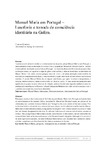Mostrar o rexistro simple do ítem
Manuel Maria em Portugal. Lusofonia e tomada de consciência identitária na Galiza
| dc.contributor.author | Quiroga, Carlos | es_ES |
| dc.date.accessioned | 2014-10-02T12:18:34Z | |
| dc.date.available | 2014-10-02T12:18:34Z | |
| dc.date.issued | 2012 | es_ES |
| dc.identifier.citation | Novas achegas ao estudo da cultura galega II. Enfoques socio-históricos e lingüístico-literarios; 2012: 151-172. ISBN: 978-84-9749-517-2 | es_ES |
| dc.identifier.isbn | 978-84-9749-517-2 | es_ES |
| dc.identifier.uri | http://hdl.handle.net/2183/13260 | |
| dc.description.abstract | [Resumo] Examina-se (em primeira instância) o relacionamento do poeta galego Manuel Maria com Portugal, e particularmente a sua colaboração na revista Céltica, lançada por Manuel de Oliveira Guerra – ativista e intermediário da relação entre a Galiza e Portugal – no início da década de 60 do século passado. Esta publicação tratava de «quebrar a capa de gêlo» entre ambos, e nela se recolheram colaborações de Manuel Maria e de vários autores galegos, tanto de vivos e em plena produção como também de escritores já desaparecidos na altura, e tanto textos de criação como ainda de teor crítico e na forma de resenhas. O jovem Manuel Maria deu aí alguns contributos, que agora revemos e recuperamos, e retomou posteriormente o contacto com a filha de Oliveira Guerra. O caso, ainda não sendo dos mais significativos quanto ao peso absoluto da relação, permite ilustrar (em segunda instância) como na configuração sociológica do Sistema Cultural Galeguista Moderno tem sido central o contacto com a Lusofonia na tomada de consciência identitária. | es_ES |
| dc.description.abstract | [Abstract] This paper examines the relationship of the Galician poet Manuel Maria with Portugal, and particularly his contributions to the journal Céltica, launched by Manuel de Oliveira Guerra, an activist of the relationship and mediator between Galicia and Portugal in the early sixties of the last century. This publication tried to «break the ice» between the two cultures, and it collected contributions by Manuel Maria and several Galician authors, living and on the height of their creative power as well as of those that had already disappeared at the time. It collected both texts of creation and of critical content or reviews. The young Manuel Maria made several contributions in this context that are recovered and reviewed here; later on he resumed contact with Oliveira Guerra’s daughter. Although it is not one of the most significant examples, the case of Manuel Maria allows us to illustrate how central the contact with the Lusophone world has been for the identity awareness in Galicia. | es_ES |
| dc.language.iso | por | es_ES |
| dc.publisher | Universidade da Coruña | es_ES |
| dc.subject | Manuel Maria | es_ES |
| dc.subject | Galeguismo | es_ES |
| dc.subject | Reintegracionismo | es_ES |
| dc.subject | Relacionamento Galiza-Portugal | es_ES |
| dc.subject | Relationship Galicia-Portugal | es_ES |
| dc.title | Manuel Maria em Portugal. Lusofonia e tomada de consciência identitária na Galiza | es_ES |
| dc.type | conference output | es_ES |
| dc.rights.accessRights | open access | es_ES |
| UDC.coleccion | Publicacións UDC | es_ES |






